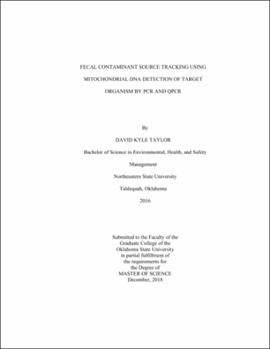| dc.contributor.advisor | Krzmarzick, Mark | |
| dc.contributor.author | Taylor, David Kyle | |
| dc.date.accessioned | 2021-08-30T15:49:59Z | |
| dc.date.available | 2021-08-30T15:49:59Z | |
| dc.date.issued | 2018-12 | |
| dc.identifier.uri | https://hdl.handle.net/11244/330754 | |
| dc.description.abstract | Water quality impairment by fecal waste pollution of surface water and groundwater is a public health issue by introducing pathogenic microorganisms and/or excessive nutrients leading to eutrophication of surface water. Current molecular methods in fecal source tracking commonly incorporate the detection of fecal bacteria that are unique to the polluting species gut microorganism community found in fecal matter. This method has been thoroughly researched without conclusive evidence of a sure and fast method for multiple species detection. In this study, we investigate and develop a standardized PCR and qPCR method for the detection and quantification of host species mitochondrial DNA (mtDNA) in affected water sources. Mitochondria are a promising candidate for fecal polluter detection, as a huge number of intestine epithelial cells are exfoliated during feces evacuation, and numerous mitochondria are present in each cell which contain multiple copies of the mitochondrial genome. We developed a comprehensive detection method of mtDNA by designing novel primers for bison, cattle, duck, geese, human, and swine. Clone libraries were developed for a standardized DNA template of the PCR product genes inserted into a commercial vector plasmid. A dilution gradient of the standards was performed for the quantification of unknown samples. Water samples with unknown quantities of mtDNA were collected from 10 locations along the Illinois River and analyzed alongside the standardized mtDNA dilution series. Our results showed that each primer is specific to the target organism and did not produce false positives, mtDNA has a low detection limit in environmental samples, and clone libraries are an effective approach to long term storage of mtDNA standards. This approach is a viable method for rapid detection of fecal waste polluters with direct specificity to the contributing species. | |
| dc.format | application/pdf | |
| dc.language | en_US | |
| dc.rights | Copyright is held by the author who has granted the Oklahoma State University Library the non-exclusive right to share this material in its institutional repository. Contact Digital Library Services at lib-dls@okstate.edu or 405-744-9161 for the permission policy on the use, reproduction or distribution of this material. | |
| dc.title | Fecal contaminant source tracking using mitochondrial DNA detection of target organism by PCR and qPCR | |
| dc.contributor.committeeMember | Fathepure, Babu | |
| dc.contributor.committeeMember | Wilber, Greg | |
| osu.filename | Taylor_okstate_0664M_16036.pdf | |
| osu.accesstype | Open Access | |
| dc.type.genre | Thesis | |
| dc.type.material | Text | |
| dc.subject.keywords | environmental engineering | |
| dc.subject.keywords | environmental science | |
| dc.subject.keywords | fecal source tracking | |
| dc.subject.keywords | molecular biology | |
| dc.subject.keywords | pcr | |
| dc.subject.keywords | water quality | |
| thesis.degree.discipline | Environmental Engineering | |
| thesis.degree.grantor | Oklahoma State University | |
